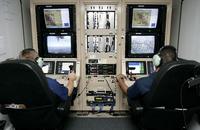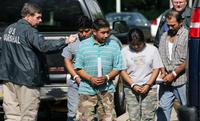-
Sen. Cornyn, critics exchange charges over immigration reform measure

Texas critics charge that Senator John Cornyn (R-Texas) is likely to oppose the Gang of Eight bipartisan immigration overhaul proposal, even though it meets his demands on border security, because he is worried about a Tea Party primary challenge. Cornyn disagrees.
-
-
Gay rights advocates want immigration reform bill to recognize gay couples
Gay rights advocates are campaigning for changes in the bi-partisan Senate immigration overhaul bill so that it would include homosexual couples. Democrats, however, are being cautious, fearing that adding a reference to gay couples would cause many GOP lawmakers to reject the bill.
-
-
Critics say drones make little contribution to border security

A new report says that U.S. Customs and Border Protection (CBP) drones are a wasteful giveaway to defense contractors and a threat to civil liberties. The report cites CBP own figures, the contribution drones make to border security is minimal. According to CBP calculations, drones have played a role in only 0.003 percent in drug seizure and 0.001 percent in illegal border crossing apprehensions.
-
-
Lawmakers question Napolitano on border-security measurement methods
Senators Tuesday grilled DHS secretary Janet Napolitano on what methods her department will use to provide a “meaningful” border-security measurement, which is a key condition for implementing a bipartisan immigration reform legislation unveiled last week.
-
-
Deportations go on while immigration reform debate continues

The Obama administration has continued to deport illegal immigrants even as the fight over immigration reform goes on. President Obama has said his administration will not stop deportation orders until immigration reform has been passed, but immigration reform advocates say the administration should stop deporting immigrants who would be eligible for the path to citizenship under the terms of the Gang of Eight immigration overhaul bill.
-
-
Reactions to Boston bombing threaten passage of immigration reform
Reactions to the Boston Marathon bombings could become threaten the passage of immigration reform in Congress. Conservative Republicans who oppose an immigration reform along the lines offered by the bipartisan Gang of Eight have spoken out on the Hill, talk radio, and social networks saying that the bill should be reconsidered in light of the fact that the suspects were born outside the United States.
-
-
U.S. hospitals shipping sick immigrants back to their home countries

Hundreds of immigrants who are in the United States illegally end up in the hospital only to find out they will be sent home through a removal system run by hospitals trying to avoid the high cost of treating illegal immigrants.
-
-
Immigration reform should address visa over-stayers
As the Gang of Eight gets ready to release its immigration overhaul plan this week, one topic of discussion is how best to verify that the 150 million foreigners who enter the United States annually actually leave. Some 40 percent of the more than ten million undocumented immigrants in the United States today came legally, but stayed after their visa expired.
-
-
Sen. Rubio says Gang of Eight proposal not “amnesty”

Senator Marco Rubio (R-Florida) rejected arguments Sunday that the Senate immigration bill offers amnesty for illegal immigrants. Rubio has been subjected to pressure from opponents of immigration overhaul, who charge that he went back on his commitment to border security as a condition to immigration reform.
-
-
DHS to focus on combatting human trafficking

The Obama administration has unveiled a plan which will focus on bolstering the prevention of human trafficking. The Federal Strategic Action Plan on Services for Victims of Human Trafficking has been developed by the White House and several federal agencies including the Departments of Justice, Health and Human Services, and Labor.
-
-
Texas Republican lawmakers introduce border security bill

Two Texas Republican legislators have introduced a bill which will mandate that DHS meet several demanding border security standards, but said that these standards will not delay progress on immigration reform. Senator John Cronyn (R-Texas) and Representative Michael McCaul (R-Texas) filed the Border Security Act of 2013 on Tuesday. The bill requires, among other things, that DHS return to reporting how much of the border is under “operational control,” reporting which the agency discontinued in 2010.
-
-
Napolitano’s arguments about border security undermined by rise in arrests

As recently as last Thursday, DHS secretary Janet Napolitano said that border security is at its most robust in years. New numbers released on the same day tell a different story about activity on the border: arrests on the border are up 13 percent compared to this time last year, from 170,223 last year to 192,298 this year. Napolitano argues that arrests alone are not a reflection of how secure the border is, and that crime statistics in border regions – a better measure of border security, she says — are down from previous years.
-
-
Bipartisan House immigration overhaul bill offers three paths to legal status
While a bipartisan Senate group – the Group of Eight – is set to unveil its immigration overhaul proposal next week when Congress returns from a break, a bipartisan group of House members has come up with its own immigration reform draft. The House members’ proposal divides illegal immigrants into three categories – “Dreamers” and agricultural workers; those with families and jobs in the United States; and those who do not belong in either of the two other categories – and offers immigrants in each category a distinct path to citizenship.
-
-
GOP lawmakers say immigration reform bill should not be rushed
As the unveiling of the bipartisan Gang of Eight’s immigration bill approaches, , Republican lawmakers, including one who is part of the bipartisan group, are asking Senate leaders to slow down the consideration of the bill so as to avoid making “fatal mistakes.”
-
-
Immigration violators spend long stretches in Washington jail
The Immigration and Customs Enforcement (ICE) can place holds on people booked into jail who may be in the United States illegally. A study of King County, Washington, jail data from 2011 found that about one in eight people with ICE holds were not charged with any crime. It also found that half of the inmates with holds were charged with misdemeanor crimes, including driving without a license. Moreover, if ICE has placed a hold on an individual in the King county jail, that individual will stay in jail an extra month on average. King county officials says all this costs the county too much money, and they want ICE to limit its holds for those who committed serious crimes.
-
More headlines
The long view
The “Invasion” Invention: The Far Right’s Long Legal Battle to Make Immigrants the Enemy
The Trump administration is using the claim that immigrants have “invaded” the country to justify possibly suspending habeas corpus, part of the constitutional right to due process. A faction of the far right has been building this case for years.
